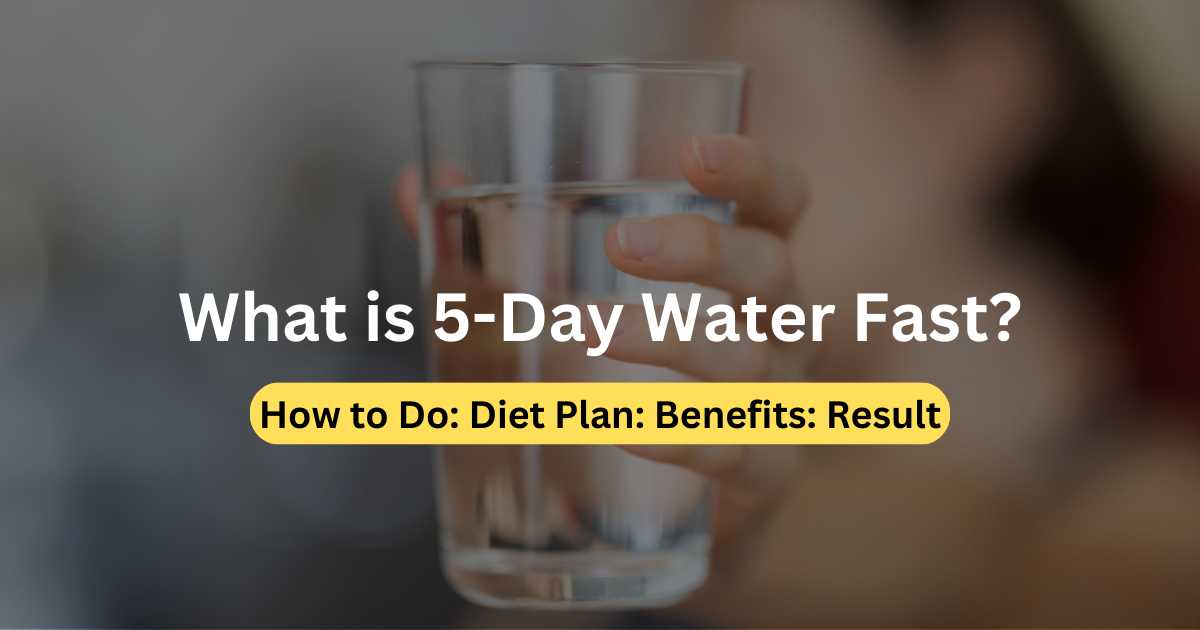More specifically, water fasting where one refrains from taking any food or any caloric liquids except water for a given number of days has become fashionable as a detoxification process, a weight reduction mechanism and an instrument for enhancing health. Although, a 5 day water fast is possible and can be very effective if done the right way. In this blog, you will learn how to do 5-day water fast, different activities you can follow on each day and the consequences you are likely to experience.


Understanding Water Fasting
But let’s first discuss what water fasting means in the first place. In case you’re unfamiliar with the concept, a water fast is the most rigorous type of fasting where one is allowed to drink water but nothing else. There are different types of fasting such as the water fast in which food, juices, and other beverages other than water are not taken in a given period of time. This practice is believed to detoxify the body, help lose weight and many other health benefits. Nevertheless, one has to be careful with fasting and preferably consult a doctor, especially with the five-day fasting.
Basic Guidelines For A 5 DAY WATER FAST
There are certain ways to prepare for the water only fast therefore it is important to plan properly for the same. Here’s how to prepare:
Consult a Healthcare Professional: In case you have other medical conditions, diseases or you are on other medications, it is recommended that you talk with your doctor before engaging in water only diets.
Ease Into the Fast: About a week to the fast you should progressively decrease your meals intake before the actual fasting day. Take sensual foods and also reduce the wastage of energy through coffee, tea and taking foods high in sugar content.
Hydrate Well: It is advisable to commence taking diet two days before the fasting season in order to ensure that the body is well-hydrated.
Day-by-Day Routine
Day 1: Initiation
Morning: One should fast after taking a small meal in the morning before undertaking any strenuous activity. The first tip that one should take is to take one large glass of water as soon as he wakes up.
Throughout the Day: Hydrate your body which means taking a lot of water. Ideally, the individual should have at least 8-10 glasses of water a day more or less depending on the person’s level of activity. It is advised to follow this mantra of drinking whenever your body tells you to do so.
Evening: If sometime you get a little uncomfortable, light stretching, or even gentle yoga would do the work. Avoid strenuous activities.
Tips:
You may feel hungry and there may be a possible headache arising from this change. This is normal.
Do not concentrate on hunger by keeping oneself occupied with minor tasks or other similar distractions.
Day 2: Adjustment
Morning: Stay with the water only plan for another week. The body starts moving slowly from the usage of glucose as energy to using stored fat.
Throughout the Day: Take liquids, especially water on a daily basis. You might observe less hunger as the body change has occurred.
Evening: Activities such as watching television, listening to music or taking a walk should be undertaken as they help in calming the nerves. A measure of moderate physical activity like walking or stretching exercises are perfectly alright.
Tips:
Rest is crucial. Steer clear from too much exercise, workouts or any vigorous activities you would not be able to handle easily.
You might notice ’emotional outbursts’ or perhaps you are easily tired. Drink water frequently and take enough rest, this is very important for anyone, especially workers.
Day 3: Ketosis Begins
Morning: Hopefully you are now in ketosis, he said where your body is burning fat to feed the brain. Keep up with the drinking of plenty of water.
Throughout the Day: You may feel that you experience less hunger as compared to your previous state. The body has got used to fasting and is using fat as the main source of energy.
Evening: The patient should carry on with light activities and go on with his everyday routine. Ideally, the use of techniques such as journaling or meditations should be employed in case of displaying any emotional shifts.
Tips:
Notice any signs of ailment such as dizziness or feelings of nausea. If these symptoms continue or become more severe, one should seek the help of a doctor.
Do not ignore signals that your body sends and try to enrich it with water.
Day 4: Deepening Ketosis
Morning: Your body has entered into ketosis meaning that most of the glucose has been used up in the body and is almost out of stock. Continue drinking water. Your energy levels might so; so all you have to do is to heed the signals from your body.
Throughout the Day: Take enough water in the day so as to ensure that the body is well hydrated throughout the day. If one feels weak or dizzying constantly, it will be advisable to cut down on physical activities.
Evening: Drink plenty of water and take part in activities that arrest the mind in the process. Rest is essential.
Tips:
It is not strange to hear that one feels hungrier, or even feels the increased level of fatigue. Have sufficient fluids and, where possible, avoid situations that are connected with food consumption.
Day 5:
In mental health, conditions might get clearer although there are chances one may get moody.
On the last day of the construction i. e. Day 5 of the grand auberge construction, the crew performs the final activities including the completion of the basic structure of the building and its reintroduction as a luxurious structure.
Morning: When you get to the final day of your fast maintain it with water and not any other form of food intake. Make necessary preparations for the analyses especially concerning the introduction of food.
Throughout the Day: Allow yourself to have foods that are light and easy on the digestive system such as soups or cooked vegetables. Do not consume big meals or meals which are hard to digest.
Evening: Make some time to ponder over the experience of fasting and how you feel and gradually return to a normal eating plan. It is always advisable to go slow in the initial hours of the day with foods that can be easily digested.
Tips:
Do not take large portions for breaking the fast as this may put a lot of strain on your system. Start with small portions.
Be aware of signs which appear when specific foods are reintroduced and make changes.
Some of the benefits that are associated with the 5 day water fast include:
Detoxification: The practice of water fasting is supposed to improve cleansing of the body since the body is given a break to rejuvenate. Some people feel that during the fasting period the body is capable of eliminating toxins and other waste products from the body better.
Improved Metabolism: Intestinal fasting may help increase metabolic rate and enhance insulin sensitivity, which will be beneficial to weight regulation and the management of blood sugar levels.
Weight Loss: A 5 day water fast may make you lose a considerable amount of weight because it is in effect letting the body burn calories and fats. Nevertheless, proper nutrition needs to be followed after fasting is advisable in order to support the weight loss process.
Enhanced Mental Clarity: Some individuals think that the cognitive function, including focus, is enhanced during the water fasting and in post-fasting period; this may be attributed to the fluctuations in blood sugar levels and metabolism of fats for energy.
Digestive Health: It is healthy to sometimes take a break from consuming solid foods and so this could be good for the digestive system and hence the gut.
Autophagy: As already stated, fasting might have resulted in autophagy, namely a process where the body disposes of damaged cells and in the process produces new ones; the cellular health might have been boosted.
Potential Risks and Considerations
While a 5-day water fast can offer benefits, it also comes with potential risks:While a 5-day water fast can offer benefits, it also comes with potential risks:
Nutrient Deficiencies: When one continues with the fasting process beyond its moderation they are bound to lack some vitamins and mineral products that are vital in the body. Since imbalance is the norm once food is reintroduced, it is imperative that the process be done rightly.
Electrolyte Imbalance: If an individual does not take electrolytes there is a tendency to suffer from imbalances and some of the symptoms include dizziness or muscle cramps.
Physical Discomfort: Sometimes, it can bring about sleepy feelings, headaches or irritability. Just as with symptoms it should be reassuring and safe to monitor and adapt if needed.
Medical Conditions: Those having specific diseases or taking some medication should not go for prolonged fasting or should consider doing this under professional medical advice.
Results You Might Expect
Short-Term Weight Loss: It will be possible to lose weight especially some pounds and some of this will be composed of water and fats. This may be so, could be for a while depending on what is taken afterward in case of improper balancing of food intake.
Increased Energy Levels: Most know the initial stages require some adjustments however, after the period many note boost in energy as well as mental performance.
Digestive Reset: After the fast you may find that your digestive system and your bowel movements are that much more efficient and at its best.
Conclusion
It is evident that a 5-day water fast can in fact be a highly effective form of detoxification, and beneficial for weight loss as well as other aspects of our general health, but it has to be done properly, and most importantly safely. It is therefore essential to prepare well, constantly gauge your body’s reactions and gradually introduce the foods to the body to get more benefits out of it but at the same time avoiding dangerous side effects. With your permission, you should please always seek the advice of your doctor before you attempt any long-term fasting. When done with the right preparations, welfare and stewardship, the 5 day water fasting comes with a lot of benefits and the accomplishment that follows.
Read More
- 24 Zero Calorie Foods That Will Improve Your Health
- 72 Hour Fast Weight Loss Results-3 Day Fast Benefits
- Walking to Lose Weight-Benefits-Pro Tip and 30 Days Plan
FAQ’s
Frequently Asked Questions about Water Fasting: Get answers to common queries about the duration, rules, and benefits of water fasting.
Ques1- How long should you water fast for?
The duration of a water fast varies, but common timeframes range from 24 hours to several days or even weeks, depending on individual goals and health considerations.
Ques2- What are the rules for a water fast?
The primary rule is abstaining from all solid foods and consuming only water (and sometimes herbal tea or black coffee) throughout the fasting period. It’s essential to stay hydrated and listen to your body’s needs.
Ques3- Is water fasting good for the body?
Water fasting has potential benefits such as weight loss, improved insulin sensitivity, autophagy, and mental clarity. However, it’s crucial to approach it safely, under proper guidance, and consider individual health conditions.




